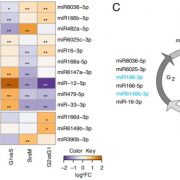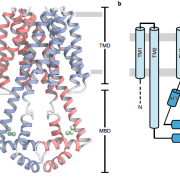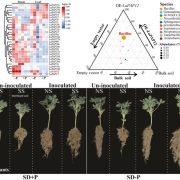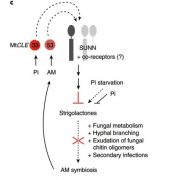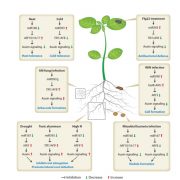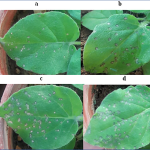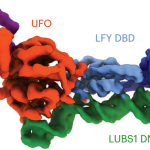MicroRNA encoded peptide affects arsenic sensitivity
 MicroRNAs (miRNAs) are small non-coding RNAs that down-regulate their targets through translational repression or mRNA cleavage. Some pri-miRNAs encode small regulatory peptides (miPEP) which regulate plant growth and development by modulating subsequent miRNA expression. How different biotic or abiotic stresses may affect the role of these peptides remains unclear. In this work, Kumar et al. focus on the role of miR408 and its encoded peptide (miPEP408) in response to heavy metal and nutrient deficiency. The authors developed CRISPR/Cas9 and overexpressing lines to unravel its role. Under sulfate deficit and As stress, the overexpressing lines showed a more sensitive phenotype, while CRISPR/Cas9 edited lines exhibited increased root length and fresh weight. Application of miPEP408 recovered the WT phenotype in CRISPR/Cas9 edited lines. The authors propose a model in which under sulfate deficit and As stress, miPEP408 regulates miR408 which downregulates glutathione S-transferase (GSTU25) and sulfur reduction genes in Arabidopsis. (Summary by Eva Maria Gomez Alvarez, @eva_ga96) Plant Physiol. 10.1093/plphys/kiad033
MicroRNAs (miRNAs) are small non-coding RNAs that down-regulate their targets through translational repression or mRNA cleavage. Some pri-miRNAs encode small regulatory peptides (miPEP) which regulate plant growth and development by modulating subsequent miRNA expression. How different biotic or abiotic stresses may affect the role of these peptides remains unclear. In this work, Kumar et al. focus on the role of miR408 and its encoded peptide (miPEP408) in response to heavy metal and nutrient deficiency. The authors developed CRISPR/Cas9 and overexpressing lines to unravel its role. Under sulfate deficit and As stress, the overexpressing lines showed a more sensitive phenotype, while CRISPR/Cas9 edited lines exhibited increased root length and fresh weight. Application of miPEP408 recovered the WT phenotype in CRISPR/Cas9 edited lines. The authors propose a model in which under sulfate deficit and As stress, miPEP408 regulates miR408 which downregulates glutathione S-transferase (GSTU25) and sulfur reduction genes in Arabidopsis. (Summary by Eva Maria Gomez Alvarez, @eva_ga96) Plant Physiol. 10.1093/plphys/kiad033


